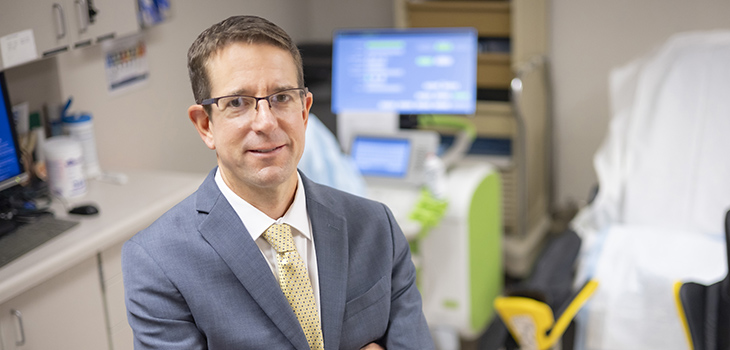September is Prostate Cancer Awareness Month
Is the PSA test the best way to detect the disease?
September marks Prostate Cancer Awareness Month and UC Davis Comprehensive Cancer Center is shining a light on the most common cancer diagnosed in men, after skin cancer. It is also the second-leading cause of cancer-related death, after lung cancer.
The cancer begins in the prostate gland, a small organ that helps produce semen. While many cases grow slowly and may not cause serious harm, others can be aggressive and require treatment.
Marc Dall’Era, chair of the UC Davis Health Department of Urologic Surgery, answers questions about prostate cancer and discusses the best way to detect it early, when it is the most treatable.

Is the PSA test the most effective screening for prostate cancer?
A PSA test is a blood test that helps doctors check the health of your prostate. The test looks for a protein called prostate-specific antigen (PSA), which is made by the prostate and can be found in your blood.
Everyone with a prostate has some PSA in their blood. But if the level is higher than normal, it could be a sign that something is wrong. That doesn’t always mean cancer — it could be caused by other things like an infection, benign enlargement or just getting older. Still, a high PSA level can be a warning sign that needs more attention.
What do the results mean?
There’s no “perfect” PSA number. In general:
- Low PSA is usually good.
- High PSA might mean cancer — but not always.
Other things like age, recent exercise or even sex can affect your PSA level. That’s why doctors look at the whole picture, not just the number.
How often should you take a PSA test?
Not everyone needs a PSA test. I recommend it annually for men over 45, especially if they have symptoms or concerns. The frequency of testing may also depend on the initial level when you start checking. Men at higher risk, like those with a family history of prostate cancer or African American men, may start annual PSA tests in their early 40s.
Is the PSA test the only test you need?
If your PSA level is high, your doctor may suggest more tests, such as:
- A Digital Rectal Exam (DRE): A doctor checks the prostate for lumps or abnormalities.
- Imaging Tests: MRI may provide a clearer picture of the prostate.
- Additional blood or urine tests: These can help further understand the risk when an abnormal PSA level is caused by cancer.
- A biopsy: If cancer is suspected based on these tests or an MRI, a small sample of prostate tissue is removed and examined under a microscope to confirm or rule out a diagnosis
If cancer is found, what are the treatment options?
Treatment depends on how aggressive the cancer is, as well as the patient’s overall health. At UC Davis Health, we may recommend the following:
- Active surveillance, which is appropriate for slow-growing cancers. Prostate cancer is monitored carefully without immediate treatment.
- Surgery may cure early-stage prostate cancers. At UC Davis Health, we specialize in minimally invasive prostatectomies (removal of the prostate gland). We routinely perform robotic-assisted prostatectomies, which help with faster recovery and less pain. We’ve also become one of the top experts in high-intensity focused ultrasound therapy for prostate cancer.
- Hormone therapy drugs reduce the amount of testosterone in your body. Since prostate cancer cells use testosterone to grow, hormone therapy may help prevent prostate cancer from recurring. Hormone therapy in combination with radiation therapy can be used for more advanced forms of prostate cancer.
- Radiation therapy kills cancer cells and is used alone or following prostate surgery. It is typically reserved for people whose cancer has not spread beyond their prostate.
Prevention: What Can You Do?
While there's no guaranteed way to prevent prostate cancer, certain lifestyle choices may help lower your risk:
- Stay active: Regular exercise helps maintain a healthy weight and supports overall health.
- Eat a balanced diet: A diet rich in fruits, vegetables and whole grains may reduce risk. Limit high-fat dairy and red meat.
- Avoid smoking: Smoking is linked to many cancers and quitting can improve your overall health.
- Know your family history: Men with a father or brother who had prostate cancer are at higher risk.
If you would like to make an appointment at UC Davis Health, call 1-800-2UCDAVIS (1-800-282-3284).
Related links:
Prostate cancer cases expected to surge in the next 15 years
UC Davis Comprehensive Cancer Center
UC Davis Comprehensive Cancer Center is the only National Cancer Institute-designated center serving the Central Valley and inland Northern California, a region of more than 6 million people. Its specialists provide compassionate, comprehensive care for more than 100,000 adults and children every year and access to more than 200 active clinical trials at any given time. Its innovative research program engages more than 240 scientists at UC Davis who work collaboratively to advance discovery of new tools to diagnose and treat cancer. Patients have access to leading-edge care, including immunotherapy and other targeted treatments. Its Office of Community Outreach and Engagement addresses disparities in cancer outcomes across diverse populations, and the cancer center provides comprehensive education and workforce development programs for the next generation of clinicians and scientists. For more information, visit cancer.ucdavis.edu.





